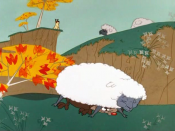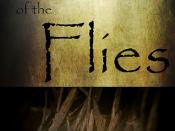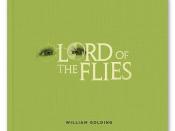Lord of the Flies This tale was an absolute sea of conflict and scandal from the very start. Many relationships we saw in the beginning changed and warped into very new things. Each chapter was littered with confrontation and discord, but many of these seemed rather insignificant in consideration of the plot as a whole. However, there was one ongoing trouble: principal, and symbolic, the prominent theme in this novel. It was Ralph versus Jack- the classic rivalry between good and evil. This was Golding's ode to the rudimentary theme in his novel: corruption, anarchy, and finally, an epic Armageddon, embodied by the ruthless power-struggles of Jack and Ralph.
In the introductory chapters we see outwardly that Jack and Ralph seem to be getting along quite well with each other. Although Jack, as a more demanding and less charismatic candidate, is defeated by Ralph in an informal election of a chief (Golding 22), he seems content to be the right-hand-man, and takes his failure in stride when Ralph gives him a consolation prize- the choir, which was to belong to him.
We even find them sharing a moment of friendliness and smiles in this first chapter (Golding 23). This very first conflict between them shows us that the status-quo expectations of society have been cast aside in this utopia as the boys are still viewing it. One would expect Jack, obviously appointed or risen to his position of chorister and head-boy (Golding 22), to naturally fall into his place as leader on the island. The fact that this is simply not the case asks us to let go of the societal pretences we have come to accept.
Later, we can sense tension building between Jack and Ralph, especially with regards to Piggy.The first very obvious differences surfacing between Jack and Ralph are seen in an act of violence on Jack's part when he smacks Piggy's glasses from his face and acts inappropriately after letting the fire out (Golding 71). This did not please Ralph, and merely reiterated the distaste he was having for Jack at that moment (Golding 72). This was Jack's reaction to the realization that he had lost Ralph's trust and respect, that he was no longer in good favour, and that Piggy was climbing the pedestal that had once belonged to him. Naturally, he acts out against Piggy, and the tacit contest for Ralph's attention and respect ensues. Jack's charade here, foreshadows the splitting apart of society, as the choir has been cast as the group which would rather hunt than be rescued, and although revered by some is persecuted in this time when sensibility and order are still in office. By this section, Jack's malevolent ways have finally surfaced, hostility and acrimony lie in the air, and we can feel a definitive crack forming in Ralph's colony. Their mutual feelings of competition and hostility are finally thrust into the open by Ralph, when after a dispute over courage and the like, he asks Jack simply, " Why do you hate me?" (Golding 118) with out an answer of any sort, and with a lot of awkwardness, they carry on as if it hadn't occurred. But every boy is aware, and the gloves have been dropped, they are on the verge of a dual.
As Jack's actions push the gap between Ralph and him even wider, he becomes bolder and bolder, eventually, single-handedly, and unexpectedly attempting to organize a mutiny against Ralph when he asks the boys, "Who thinks Ralph oughtn't to be chief?" (Golding 127) at an assembly. Without support in any form from the masses, Jack turns his back on the colony and declares himself his own tribe, willing to accept new members when he says "I'm going off by myselfâ¦Anyone who wants to hunt when I do can come too." (Golding 127). Ralph acting in disbelief, chooses to ignore Jack's theatrics, and gets on with business, but as his tribe's loyalty begins to dwindle, and the boys trickle discreetly to the unfriendly side of the island, Ralph finds himself in despair, and confusion.
He looks to Piggy for a voice of reason.
As Jack and his tribe become more and more involved with their rituals and exclusivity, their savage instincts begin to surface. In this section, Ralph's closest companions are killed. First, Simon, in the heat of a hunting dance, where "â¦they could see how small a beast it was; and already, it's blood was staining the sand." (Golding153) , they realize they have murdered SImon, not a beast. Every boy pretends that this did not happen, and goes on with life, they go so far as to refuse to acknowledge it's occurrence. Soon after, Jack and his hooligans raid Ralph's camp for Piggy's specs, luring Ralph and him, intended or not, to the other tribe's end. Here, Roger, without warning, crushes Piggy with a large boulder and lever when, "The rock struck Piggy, a glancing blow from chin to kneeâ¦PIggy fell forty feet and landed on his back on the square red rock in the sea" (Golding 181). Jack reacts to this as if it were pleasing to him, he sees the death of Piggy as a trophy of some sort, and it is compared subtly to the hunting and killing of the pigs. Jack threatens Ralph with the thought of a fate similar to Piggy's. And it now seems that he has the upper hand.
The subsequent chapters are a whirlwind of adrenaline filled hide-and-seek as Jack and the others form a man hunt, in hopes of finding and capturing Ralph. With enemies coming toward him in every direction, and not an ally remaining, Ralph is left to his own devices.After many hours of cat-and-mouse charades, in a final, desparate attempt to stay alive for minutes longer, Ralph jumps out of hiding and makes a run for it. With the threats of death on his heels, he stumbles onto the beach, pulling himself forward, with his last ounce of strength, mustering his final breath of courage to escape the horrible fate which was creeping up behind him. In the thick of this Armageddon, we are abruptly thrust into the realization, that these children are playing games, that they are silly, and immature, and in no real danger. The fighting stops and the humiliation ensues as an adult graces the scene.
Of course, as always, good is not defeated in the end, Ralph walks away fairly unharmed, and order resumes. But we are offered a rare glimpse into the natural behaviour of uninhibited humans, a society, broken-up, and children left to their own motives. We understand that the final question will always be "good or bad?". And we see that Golding wishes to express something to his reader, the message no matter how unkind- we're all evil inside, whether or not we let it out is left up to us. But, if you're going to give up your inhibitions in favour of anarchy and the like, expect the morally-just side to put up a damn good fight.
Works Cited Golding, William. Lord of the Flies. New York: Berkly Publishing Group, 1954





